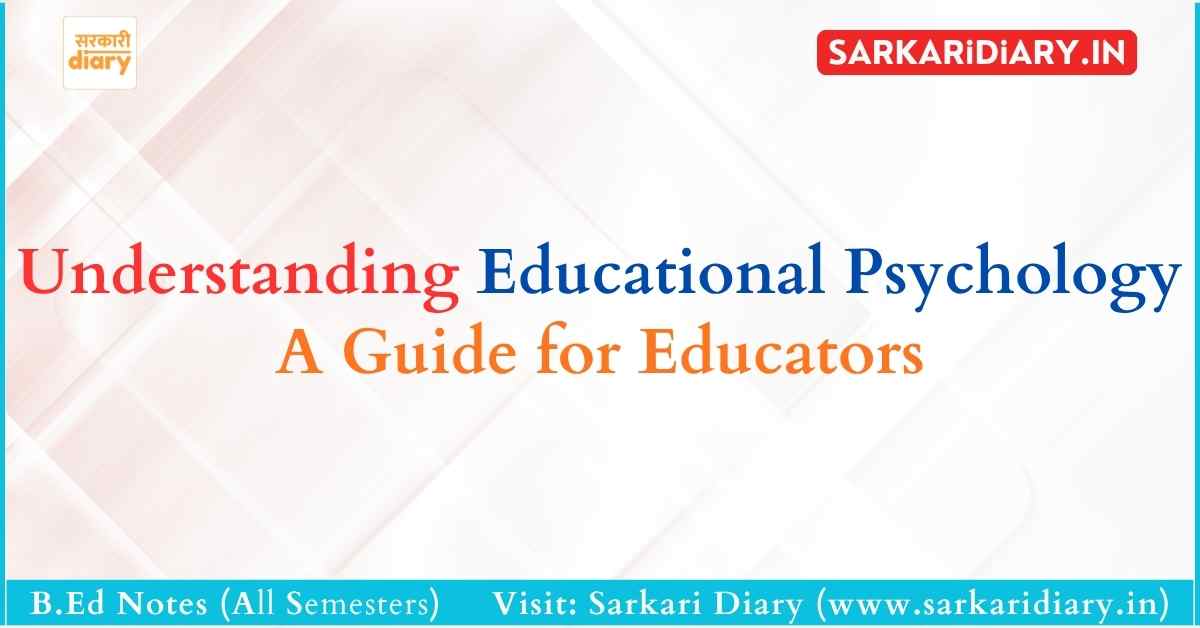Educational Psychology plays a crucial role in enhancing the effectiveness of teaching and learning. It provides teachers with insights into the what, why, when, where, and how of education. This branch of psychology is essential for educators aiming to create meaningful, student-centric learning environments.

Key Questions Addressed by Educational Psychology
Educational Psychology helps teachers find answers to fundamental questions that shape the teaching-learning process:
| Question | Explanation |
|---|---|
| Who are to be educated? | Identifying the learners and understanding their individual needs and abilities. |
| Why should one be educated? | Understanding the purpose of education in personal and societal development. |
| Where should education be given? | Determining suitable learning environments and institutional settings. |
| When should it be given? | Recognising age-appropriate learning phases and developmental readiness. |
| How should it be given? | Adopting effective pedagogical methods and instructional strategies. |
These questions guide educators in making informed decisions that enhance student engagement and achievement.
Dimensions of Educational Psychology
Educational Psychology encompasses various dimensions that influence both teaching and learning. These include:
- Learner Characteristics
Understanding developmental stages, learning styles, motivation, and personality traits. - Teaching-Learning Context
Analysing classroom dynamics, social environment, and the influence of cultural backgrounds. - Teaching Methods and Strategies
Applying appropriate instructional techniques tailored to students’ needs and contexts. - Student Mentality and Mental Hygiene
Addressing emotional well-being, stress management, and promoting positive mental health.
These dimensions enable teachers to design and deliver more effective, inclusive, and supportive educational experiences.
Role of the Teacher in Holistic Development
A teacher’s role extends beyond content delivery to facilitating the overall growth of students. Educational Psychology helps educators nurture development across three core domains of human behaviour:
| Domain | Focus Area | Examples |
|---|---|---|
| Cognitive | Intellectual and mental capabilities | Thinking, reasoning, problem-solving |
| Affective | Emotions, attitudes, and values | Motivation, empathy, emotional intelligence |
| Psychomotor | Physical and motor skills | Hand-eye coordination, handwriting, sports skills |
These domains are interrelated and must be developed harmoniously to ensure the all-round development of students.
Importance of Psychological Knowledge for Teachers
An understanding of Educational Psychology benefits teachers in several critical ways:
| Area | Impact on Teaching |
|---|---|
| Self-Understanding | Enables educators to recognise their strengths, limitations, and biases. |
| Professional Development | Enhances teaching skills, classroom management, and student engagement. |
| Meeting Social Demands | Prepares teachers to respond to societal needs and educational reforms. |
By applying psychological principles, educators become more reflective, empathetic, and effective in their practice.
Conclusion
Educational Psychology serves as a foundation for effective teaching. It empowers teachers to understand their students, refine their methods, and contribute meaningfully to the educational process. In today’s dynamic and diverse classrooms, the knowledge of Educational Psychology is not just beneficial—it’s essential.